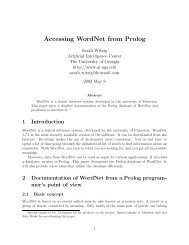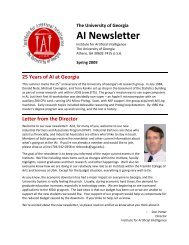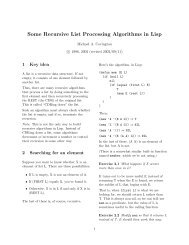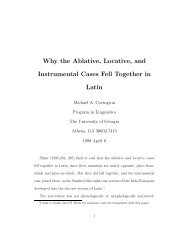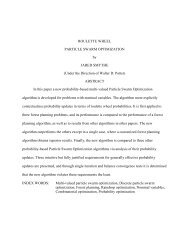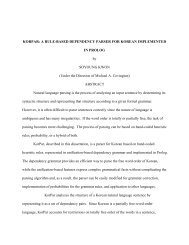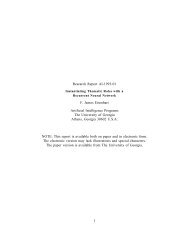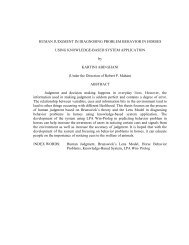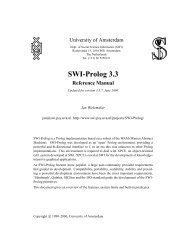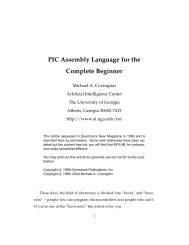How to Write More Clearly, Think More Clearly - Artificial Intelligence ...
How to Write More Clearly, Think More Clearly - Artificial Intelligence ...
How to Write More Clearly, Think More Clearly - Artificial Intelligence ...
Create successful ePaper yourself
Turn your PDF publications into a flip-book with our unique Google optimized e-Paper software.
<strong>How</strong> <strong>to</strong> <strong>Write</strong> <strong>More</strong> <strong>Clearly</strong>,<br />
<strong>Think</strong> <strong>More</strong> <strong>Clearly</strong>, and<br />
Learn Complex Material <strong>More</strong> Easily<br />
Michael A. Coving<strong>to</strong>n<br />
<strong>Artificial</strong> <strong>Intelligence</strong> Center<br />
The University of Georgia
Copyright © 2005, 2009 Michael A. Coving<strong>to</strong>n<br />
This is a draft of material intended for commercial publication.<br />
Do not redistribute without permission.<br />
(You are of course welcome <strong>to</strong> link <strong>to</strong> its<br />
location on the author’s web site.)<br />
The author is available <strong>to</strong> give seminars and write articles based on this material.<br />
Please contact mc@coving<strong>to</strong>ninnovations.com for more information.
“I don’t think I’m really<br />
all that intelligent,<br />
but I have a talent for<br />
amplifying my intelligence.”<br />
— R. D. G., 1975
Amplifying your intelligence<br />
<strong>How</strong> <strong>to</strong>…<br />
• <strong>Write</strong> more clearly<br />
• <strong>Think</strong> more clearly<br />
• Learn more easily<br />
My central claim:<br />
These are connected!
Amplifying your intelligence<br />
<strong>How</strong> <strong>to</strong> write more clearly<br />
(and why you<br />
should want <strong>to</strong>)
Why?<br />
<strong>How</strong> <strong>to</strong> write more clearly<br />
• People who write are powerful.<br />
• In science, technology, or management,<br />
you influence people by writing things for<br />
them <strong>to</strong> read.
Why?<br />
<strong>How</strong> <strong>to</strong> write more clearly<br />
• Clear writing leads <strong>to</strong> clear thinking.<br />
• You don’t know what you know until you<br />
try <strong>to</strong> express it.<br />
• If your writing is nonsense, maybe your<br />
thoughts are nonsense <strong>to</strong>o!
Misconceptions about writing<br />
Myth: Writing is mainly about poetry and fiction.<br />
Fact: That would be like saying exercise is mainly<br />
about ballet dancing!<br />
Most of the writing in the world is for information.<br />
It’s often done by people who don’t even like<br />
poetry and fiction.
Misconceptions about writing<br />
Myth: <strong>Write</strong>rs are people who have memorized<br />
big books of grammar rules.<br />
Fact: Grammar is not the problem.<br />
You are exposed <strong>to</strong> huge amounts of good<br />
English every day.<br />
If you know what you’re trying <strong>to</strong> say, 99% of the<br />
time you’ll say it grammatically.
Misconceptions about writing<br />
Language (including grammar) is an inborn<br />
capability of the human brain.<br />
The living language comes first;<br />
then people try <strong>to</strong> write grammar books<br />
in order <strong>to</strong> describe it.<br />
You do not have <strong>to</strong> be able <strong>to</strong> name and classify<br />
the parts of your language<br />
in order <strong>to</strong> use them!
Misconceptions about writing<br />
At most, an educated person needs help with only<br />
a few small points of grammar.<br />
Of a 100-page grammar book, you may need 3<br />
pages, or less.<br />
(Get people <strong>to</strong> help you figure out which 3!)
<strong>How</strong> <strong>to</strong> write more clearly<br />
The unselfish perspective<br />
Good writing is partly a matter of character.<br />
Instead of doing what’s easy for you,<br />
do what’s easy for your reader.
<strong>How</strong> <strong>to</strong> write more clearly<br />
The unselfish perspective<br />
I’m not giving this presentation<br />
(or writing this paper)<br />
because I’m important.<br />
I’m doing it because you’re important.
<strong>How</strong> <strong>to</strong> write more clearly<br />
The unselfish perspective<br />
I’m not going <strong>to</strong> demand that you<br />
put up with my quirks<br />
(bad spelling, bad organization, sloppiness).<br />
I’m going <strong>to</strong><br />
package the information so that it<br />
enters your heads as easily as possible.
<strong>How</strong> <strong>to</strong> write more clearly<br />
Writing is<br />
almost <strong>to</strong>o complicated<br />
for human beings <strong>to</strong> do.<br />
We must<br />
break up the process of writing<br />
in order <strong>to</strong> make it possible.
Five steps:<br />
The writing process<br />
Planning (deciding what & how <strong>to</strong> write)<br />
Drafting (getting it on paper once)<br />
Revising (getting it on paper better)<br />
Editing (fixing spelling, grammar, typing)<br />
Formatting (choosing typefaces, layout, etc.)
Ask yourself:<br />
Planning<br />
Why am I writing this?<br />
Who is the audience?<br />
What does the reader know/expect/want?<br />
<strong>How</strong> can I organize it?<br />
What are the format and style requirements?
Planning<br />
If you can’t envision the audience, try<br />
using yourself as a sample.<br />
If someone had needed <strong>to</strong> give you<br />
this information 6 months ago,<br />
how should they have done it?
Planning<br />
Organizing a written paper<br />
is just like structured programming:<br />
Every section has its purpose<br />
and is broken down in<strong>to</strong> smaller sections<br />
each of which has its purpose.
Planning<br />
If you can’t figure out how <strong>to</strong><br />
organize your material, try this:<br />
<strong>Write</strong> down ideas in random order,<br />
then sort them.
Planning<br />
You don’t have <strong>to</strong> plan – or write – the<br />
sections in linear order.<br />
I often write the introduction last,<br />
after I know what it will introduce!
Drafting<br />
In the drafting step,<br />
get it down on paper<br />
– not elegantly, not perfectly, just<br />
get it down on paper<br />
so you no longer have <strong>to</strong><br />
hold it all in your brain!
Drafting<br />
During drafting,<br />
do not worry about<br />
grammar, spelling, or format.<br />
Concentrate on what you want <strong>to</strong> say<br />
and how you’re going <strong>to</strong> organize it.
Drafting<br />
Three rules for clear writing:<br />
1. Get <strong>to</strong> the point.<br />
2. Get <strong>to</strong> the point.<br />
3. Get <strong>to</strong> the point.<br />
Your reader won’t follow you<br />
down a garden path.
Drafting<br />
To keep things clear and readable:<br />
State the main point before you give the<br />
reasoning that leads <strong>to</strong> it.<br />
(Unless you’re writing a detective s<strong>to</strong>ry!)
Drafting<br />
To keep things clear and readable:<br />
Put the main point of each paragraph<br />
in its first sentence.<br />
That way, people can skim your paper<br />
by reading just the first sentences of the<br />
paragraphs.<br />
Lots of them will !
K.I.S.S.<br />
(Keep it simple, stupid!)<br />
Drafting<br />
Always use the<br />
clearest, simplest language<br />
that will do the job.<br />
NEVER try <strong>to</strong> sound formal or sophisticated.
Drafting<br />
If your paper isn’t full of street slang,<br />
it is already formal enough.<br />
Stuffy writing is bad writing!!!!
What words should you<br />
never use in writing?<br />
Drafting<br />
Words whose exact meanings<br />
you don’t know!<br />
Never use a word unless you<br />
know EXACTLY what it means.<br />
(<strong>More</strong> about this later.)
Now the fun begins!<br />
Revising<br />
With computers,<br />
we can revise anything,<br />
any number of times, without wasting paper.<br />
In the bad old days, it wasn’t that easy!
Revising<br />
The goal of the revising step is <strong>to</strong><br />
make your writing clearer<br />
and easier <strong>to</strong> read.<br />
This is done mainly by finding<br />
better ways <strong>to</strong> put ideas in<strong>to</strong> words.
Revising<br />
When revising,<br />
pretend <strong>to</strong> be your own worst enemy.<br />
Is there anything that<br />
can be misunders<strong>to</strong>od?<br />
If so, change it so that it can’t!
Revising<br />
BEFORE: “Students may request…”<br />
AFTER: “Students are allowed <strong>to</strong> request…”<br />
OR ? “Students sometimes request…”
Revising<br />
Make sure the main point of each paragraph<br />
is in the first sentence.<br />
A person reading just the first sentences<br />
of the paragraphs<br />
should get a summary of your paper.
Revising<br />
Whenever possible,<br />
shorten your sentences<br />
by removing needless words.<br />
Time taken <strong>to</strong> process an n-word sentence<br />
is proportional <strong>to</strong> n 3 , or more.<br />
Cut the length in half, and you make it<br />
8 times easier <strong>to</strong> read. (Maybe.)
An example:<br />
Revising<br />
“One of the best things you can do for<br />
yourself <strong>to</strong> improve your writing is <strong>to</strong> learn<br />
how <strong>to</strong> cut out words that are not<br />
necessary.”<br />
Keep watching…
An example:<br />
Revising<br />
“One of the best things you can do for<br />
yourself <strong>to</strong> improve your writing is <strong>to</strong> learn<br />
how <strong>to</strong> cut out words that are not<br />
necessary.”<br />
Keep watching…
An example:<br />
Revising<br />
“One of the best ways <strong>to</strong> improve your<br />
writing is <strong>to</strong> learn how <strong>to</strong> cut out words that<br />
are not necessary.”<br />
Keep watching…
An example:<br />
Revising<br />
“One of the best ways <strong>to</strong> improve your<br />
writing is <strong>to</strong> learn how <strong>to</strong> cut out words that<br />
are not necessary.”<br />
Keep watching…
An example:<br />
Revising<br />
“One of the best ways <strong>to</strong> improve your<br />
writing is <strong>to</strong> learn how <strong>to</strong> cut out<br />
unnecessary words.”<br />
That’s a lot better.<br />
Can we go further?
An example:<br />
Revising<br />
“One of the best ways <strong>to</strong> improve your<br />
writing is <strong>to</strong> learn how <strong>to</strong> cut out<br />
unnecessary words.”<br />
Keep watching…
An example:<br />
Revising<br />
“To improve your writing, learn how <strong>to</strong> cut<br />
out unnecessary words.”<br />
Keep watching…
An example:<br />
Revising<br />
“To improve your writing, learn how <strong>to</strong> cut<br />
out unnecessary words.”<br />
Keep watching…
An example:<br />
Revising<br />
“To improve your writing, cut out<br />
unnecessary words.”<br />
There! 25 words reduced <strong>to</strong> 8!
Editing<br />
Editing is where you fix up the grammar,<br />
spelling, and punctuation.<br />
Guess what?<br />
Your computer doesn’t know best.<br />
It doesn’t know what you’re trying <strong>to</strong> say!
Editing<br />
Grammar, spelling, and punctuation<br />
are not a layer of added decoration.<br />
They help express the meaning.<br />
If you let a computer “correct” them,<br />
you may not get what you intend.<br />
“Spilling chequers or grate!”
Editing<br />
What if you’re a “bad speller”?<br />
Some exhortations…
Editing<br />
Don’t be quick <strong>to</strong> label yourself a “bad speller.”<br />
Remember, none of us were born<br />
knowing how <strong>to</strong> spell.<br />
If you can spell<br />
int main(int argc; char* argv[]);<br />
you can learn how <strong>to</strong> spell<br />
its and it’s !
Editing<br />
To become a better speller…<br />
(1) Take the time <strong>to</strong> learn the spellings<br />
in the first place.<br />
(2) Don’t practice bad habits.<br />
Whatever you normally write<br />
will look correct <strong>to</strong> you!
Editing<br />
To become a better speller…<br />
(3) Recognize related words<br />
(govern, government…).<br />
(4) Pronounce words carefully, or even<br />
comically, <strong>to</strong> help you remember spellings<br />
(significant, California – not Cal-uh-fornia!).
Editing<br />
By the way, in case you’re wondering,<br />
the difference between its and it’s<br />
= the difference between his and he’s.<br />
his = of him its = of it<br />
he’s = he is it’s = it is<br />
This is my idea of how <strong>to</strong> teach grammar!
Formatting<br />
With computers, we can make decisions<br />
about layout and typography<br />
long after we write the text.<br />
And we all need some training in graphics!
The basics:<br />
Formatting<br />
• Keep it simple<br />
• Keep it standard<br />
• Avoid meaningless variation
Keep it simple<br />
Formatting<br />
Use familiar typefaces,<br />
no more than 2 or 3 in a document,<br />
each with a clearly defined purpose.
Keep it simple<br />
Formatting<br />
Use conventional roman type for text,<br />
typewriter type for computer programs,<br />
and maybe sans-serif type for headings.<br />
Sans-serif type is also good for labels<br />
and presentations.
Formatting<br />
Keep it simple <br />
Needless decoration<br />
distracts the reader<br />
and<br />
can look really<br />
stupid!
Never draw the reader’s eye<br />
<strong>to</strong> anything<br />
that is not<br />
the main point.
Keep it standard<br />
Formatting<br />
Look at well-produced material<br />
and make sure you’re<br />
following accepted practices.<br />
Don’t leave out anything basic, such as<br />
page numbers or adequate margins!
Keep it standard<br />
Formatting<br />
This is not your grandpa’s typewriter.<br />
Use italics instead of underlining.<br />
Use a dash (—) instead of 2 hyphens (--).<br />
Follow the standard practices of the printing<br />
industry, not the limitations of the typewriter!
Formatting<br />
Avoid meaningless variation<br />
A basic principle of communication:<br />
The reader will expect every change<br />
<strong>to</strong> mean something.
Formatting<br />
Avoid meaningless variation<br />
If you have 2 typefaces,<br />
or different margins in different places,<br />
there had better be a reason,<br />
or the reader will waste a LOT of time<br />
looking for one!
• So much for writing more clearly.<br />
• Now for thinking more clearly…
Amplifying your intelligence<br />
<strong>How</strong> <strong>to</strong> think more clearly<br />
• Language<br />
• Logic<br />
• Epistemology
Language<br />
We all use language<br />
(or other symbolic representations)<br />
<strong>to</strong> do most of our thinking.<br />
Here are some<br />
insights from philosophy of language.
Language<br />
Earlier I said<br />
not <strong>to</strong> use words<br />
if you don’t know what they mean.<br />
<strong>How</strong> do you know whether you know<br />
what a word means?
An answer:<br />
Language<br />
You know what “dog” means<br />
if you know how <strong>to</strong> look at things<br />
and tell whether or not they are dogs.
Or more generally:<br />
Language<br />
You know what “dog” means<br />
if you know how, in principle,<br />
<strong>to</strong> tell whether things are dogs,<br />
even if you cannot perform the test yourself.
Language<br />
Dilbert’s boss wants<br />
“an object-oriented database”<br />
but he does not know<br />
what makes a thing a database<br />
or what makes it object-oriented.<br />
He doesn’t know what he’s talking about!
Language<br />
Our knowledge of word meanings is<br />
sometimes imprecise.<br />
Do you know what “elm” means? …
Language<br />
Levels of knowing the meaning of “elm”:<br />
(1) It’s a tree.<br />
(2) It grows in the USA and looks a lot like<br />
an oak or maple.<br />
(3) It’s exactly so-and-so…
Language<br />
Is it ever legitimate <strong>to</strong> use a word<br />
without knowing its exact meaning?<br />
Maybe.
Example 1:<br />
Language<br />
I can tell you there are elms in New Haven,<br />
Connecticut, even though I can’t identify<br />
them myself.<br />
I am relying on other people’s authority for<br />
the correct use of the word.
Example 2:<br />
Language<br />
The clerk at Radio Shack knows they sell<br />
things called capaci<strong>to</strong>rs, identified by<br />
certain numbers.<br />
He/she can sell me a 22-µF, 35-V capaci<strong>to</strong>r<br />
without knowing what a capaci<strong>to</strong>r really<br />
is or what the numbers mean.
Example 3:<br />
Language<br />
Dilbert’s boss wants an “object-oriented<br />
database.”<br />
(Relying on reliable authority, or just making<br />
a fool of himself? The difference is<br />
sometimes subtle!)
Language<br />
The important thing is that<br />
you should know whether you know<br />
what your words mean.<br />
Do not get used <strong>to</strong><br />
putting words <strong>to</strong>gether in familiar ways<br />
without understanding them!
Language<br />
<strong>How</strong> do you know<br />
what a sentence means?<br />
Largely, by knowing<br />
how <strong>to</strong> find out if it’s true or false.<br />
The test may be impossible <strong>to</strong> perform,<br />
but you should have an idea<br />
what it would be.
Language<br />
Example:<br />
“All dogs are brown”<br />
can be proved true by examining all the dogs in<br />
the world and finding them brown,<br />
or proved false by finding one black dog.<br />
If you don’t know that, you don’t know what<br />
“All dogs are brown” means.
Oops!<br />
Logic<br />
We’ve strayed from<br />
philosophy of language<br />
<strong>to</strong><br />
logic.<br />
Let’s keep going…
Logic<br />
Some sentences, such as<br />
“Murder is wrong,”<br />
cannot be proved true or false<br />
by physical tests.<br />
I do not think this means that they<br />
are “meaningless” or “neither true nor false,”<br />
only that they are different from sentences<br />
about physical facts.
Logic<br />
Some sentences, such as<br />
“There are invisible, undetectable elves<br />
all over this room,”<br />
really are meaningless;<br />
there is no imaginable way<br />
<strong>to</strong> prove them true or false.
Logic<br />
Some sentences that sound very deep,<br />
such as,<br />
“Everything happens exactly the way<br />
it was fated <strong>to</strong> happen,”<br />
may be just as meaningless as<br />
the sentence about elves.
Epistemology<br />
Epistemology is the study of<br />
how <strong>to</strong> acquire knowledge<br />
by observing the world around you.
Epistemology<br />
The goal is <strong>to</strong> end up<br />
believing things that are true<br />
and<br />
not believing things that are false.
Epistemology<br />
Your epistemology has gone wrong if you<br />
disbelieve things that are true,<br />
or if you believe things that are not true.
Epistemology<br />
“Scientific method”<br />
is part (not all) of epistemology.
Epistemology<br />
<strong>How</strong> <strong>to</strong> form beliefs based on evidence:<br />
(1) Propose a belief (a hypothesis).<br />
(It should be something that, if true, would be<br />
worth knowing, not a waste of mental effort.)<br />
(2) Try <strong>to</strong> confirm it.<br />
(3) Also try <strong>to</strong> disprove it.
Stages:<br />
Epistemology<br />
(1) Conjecture or guess<br />
(2) Opinion; belief supported by evidence<br />
(3) Firm belief, thoroughly tested against evidence<br />
and still holding up<br />
This looks like science, but is actually<br />
applicable <strong>to</strong> thinking about almost anything.
Epistemology<br />
Really important point<br />
(from Sir Karl Popper):<br />
A belief isn’t warranted unless you<br />
could have known if it’s not true.<br />
That is, there should be some way that<br />
you could tell if it were false.
Epistemology<br />
Popper’s principle implies:<br />
(1) Your guesses and opinions have <strong>to</strong> be<br />
testable.<br />
They have <strong>to</strong> say what will not happen.<br />
Beware of vague predictions that are compatible<br />
with any outcome!
Epistemology<br />
Popper’s principle implies:<br />
(2) It’s your job <strong>to</strong><br />
test your opinions against evidence.<br />
You should always be looking for evidence that<br />
your current beliefs are not correct.
Example:<br />
Epistemology<br />
If you believe all dogs are black,<br />
you must not only look for black dogs,<br />
but also look for dogs that aren’t black.
Epistemology<br />
Fortunetellers, quacks, and salesmen<br />
want you <strong>to</strong><br />
only try <strong>to</strong> prove your guesses true<br />
and<br />
not try <strong>to</strong> prove them false.<br />
Coving<strong>to</strong>n’s Law of Medical Research:<br />
Somebody will get well<br />
no matter what is done <strong>to</strong> them.
Epistemology<br />
Now let me attack some<br />
widespread and fashionable<br />
epistemological mistakes<br />
from the late 20th century.
Epistemology<br />
Misconception:<br />
“It’s OK <strong>to</strong> believe anything you want, because<br />
we never really know anything; it’s all just<br />
opinions.”<br />
Fact 1:<br />
Our knowledge of the world is incomplete.<br />
Fact 2:<br />
Nonetheless, the world is objectively real.
Epistemology<br />
If you step out in front of a bus,<br />
it will run over you,<br />
even if you can find people<br />
whose opinion is different.
Epistemology<br />
Misconception:<br />
“If there are good arguments on both<br />
sides of a controversy, then the<br />
question is undecidable.”<br />
Fact:<br />
The evidence for one side can still be a<br />
lot stronger than the evidence for the<br />
other.
Epistemology<br />
It is important <strong>to</strong> be able <strong>to</strong><br />
understand and present sympathetically<br />
a position that you do not agree with.<br />
If people believe something,<br />
they probably have a reason<br />
worth knowing about<br />
even if they’re mistaken.
Example:<br />
Epistemology<br />
The earth is round.<br />
But some people think it’s flat,<br />
and we should be able <strong>to</strong> explain<br />
why it looks flat.
Epistemology<br />
Misconception:<br />
“It is unfair <strong>to</strong> say that anything is really<br />
better than anything else.”<br />
Fact:<br />
Because the world is objectively real, of course<br />
some things are better than others, by any<br />
reasonable criteria.<br />
You’re not just “showing your cultural bias”<br />
when you say so.
Misconception:<br />
Fact:<br />
Epistemology<br />
“You have no right <strong>to</strong> impose your beliefs<br />
on me.”<br />
It sounds like you’re “imposing” a belief on me!<br />
Lots of beliefs are “imposed” on us by evidence.
Misconception:<br />
Fact:<br />
Epistemology<br />
“If something isn’t subject <strong>to</strong> physical<br />
measurement (or doesn’t fit in a<br />
preconceived system), it doesn’t exist.”<br />
If all knowledge depends on physical<br />
measurement, then not only do you lose truth,<br />
beauty, and love, you also lose mathematics,<br />
logic, and even epistemology!
Amplifying your intelligence<br />
<strong>How</strong> <strong>to</strong> learn<br />
complex material<br />
more easily
<strong>How</strong> <strong>to</strong> learn…<br />
I’ll be brief because I’ve already<br />
given you the <strong>to</strong>ols.
<strong>How</strong> <strong>to</strong> learn…<br />
1. Have goals and adjust them often.<br />
2. Use a suitable learning strategy.<br />
3. Insist on clear understanding.<br />
4. Organize the knowledge for yourself.
Have goals…<br />
You have <strong>to</strong><br />
want <strong>to</strong> learn something<br />
and<br />
have some idea what it is.<br />
Don’t wait passively<br />
for the teacher or textbook <strong>to</strong><br />
take you on a ride.
Have goals…<br />
Because you don’t start out<br />
knowing exactly what you’re going <strong>to</strong> learn,<br />
you must constantly<br />
update your goals<br />
as the material is revealed <strong>to</strong> you.<br />
Changing your goals is OK.<br />
Not having goals is not!
Example:<br />
Have goals…<br />
We don’t read textbooks like novels,<br />
just <strong>to</strong> see where they go.<br />
We read textbooks because<br />
we want them <strong>to</strong> tell us something<br />
(incl. tell us what they’re going <strong>to</strong> tell us!).
Learning strategy<br />
When a student finds my courses<br />
unduly hard, it’s usually because of<br />
the wrong learning strategy…<br />
• Memorizing what should be deduced<br />
• Deducing what should be memorized<br />
• Skipping essential background<br />
• Demanding background that isn’t there
Learning strategy<br />
• Different kinds of material<br />
require different learning strategies.
Learning strategy<br />
A learning strategy for his<strong>to</strong>ry or literature:<br />
• Main goal is familiarization with lots of things.<br />
• Many large trends but few rigorous logical<br />
connections.<br />
• There is no starting point – you can start<br />
anywhere.<br />
• Read a lot of books and “get the big picture.”<br />
• Subjective judgment is important; careful<br />
reasoning is not.
Learning strategy<br />
A learning strategy for mathematical science:<br />
• Main goal is clear understanding of key points.<br />
• Important ideas are not so much learned as<br />
rediscovered, often in a flash of insight.<br />
• It is important <strong>to</strong> trace ideas <strong>to</strong> their sources<br />
(remember who discovered them).<br />
• You must take things in order; if you skip a<br />
chapter, or even a page of definitions, you’re<br />
lost.
Learning strategy<br />
A learning strategy for engineering or computer<br />
programming:<br />
• Main goal is <strong>to</strong> apply science <strong>to</strong> solve problems.<br />
• It’s easy <strong>to</strong> experiment <strong>to</strong> find out whether your<br />
solutions work (especially with computers).<br />
• You must learn things in order.<br />
• No need <strong>to</strong> trace ideas <strong>to</strong> sources; any book that<br />
gives you the information will do.<br />
• Tendency <strong>to</strong> follow authorities blindly.
Learning strategy<br />
A student who is only good at one subject<br />
is often<br />
someone who only has one<br />
learning strategy.
Clear understanding<br />
Insist on clear understanding!<br />
My C and D students are<br />
so accus<strong>to</strong>med <strong>to</strong> being confused<br />
that<br />
they don’t realize it isn’t normal.
Clear understanding<br />
We’ve already talked about<br />
how <strong>to</strong> know<br />
whether you understand a word<br />
and<br />
whether you understand a sentence.<br />
Put that knowledge <strong>to</strong> use!
Clear understanding<br />
Learn the vocabulary,<br />
and be precise about it.<br />
If you don’t,<br />
you can’t learn anything else.
Clear understanding<br />
If something is unclear,<br />
don’t wait for it <strong>to</strong> clear up later.<br />
Back up and get it clear.<br />
Students who are lost<br />
have always been lost longer<br />
than they want <strong>to</strong> admit.
Clear understanding<br />
If you guess anything,<br />
you must test your guess immediately.<br />
Not just whether it might be true…<br />
but also whether it might be false.<br />
(Remember epistemology?)
Clear understanding<br />
Our educational system<br />
encourages unclear understanding.<br />
If 70% is a passing grade,<br />
you can almost get by with<br />
nothing but guesses and vague familiarity.
Clear understanding<br />
70% knowledge of American his<strong>to</strong>ry<br />
is worthwhile, but…<br />
70% of the multiplication table (with random gaps)<br />
is almost useless!<br />
People accus<strong>to</strong>med <strong>to</strong> incomplete learning<br />
get terribly lost in rigorous, logical,<br />
mathematical material.
Organizing knowledge<br />
Don’t expect the teacher or the textbook <strong>to</strong><br />
organize the contents of your head for you.<br />
Organize the knowledge yourself.<br />
Make your own notes.<br />
Pretend you’re writing a textbook!<br />
That’s how I ended up writing so many<br />
books…
Organizing knowledge<br />
Constantly<br />
check your own understanding<br />
in as many ways as you can.<br />
Try things on the computer…<br />
check other reference books…<br />
quiz yourself…<br />
try explaining the material <strong>to</strong> others.
Organizing knowledge<br />
Learning is a lot like writing a book.<br />
The goal is <strong>to</strong> build a structure in your own<br />
mind,<br />
not <strong>to</strong> absorb something that somebody<br />
else gives you.<br />
The knowledge in your mind is your own<br />
creative product! We build our own <strong>to</strong>ols.
THE END



